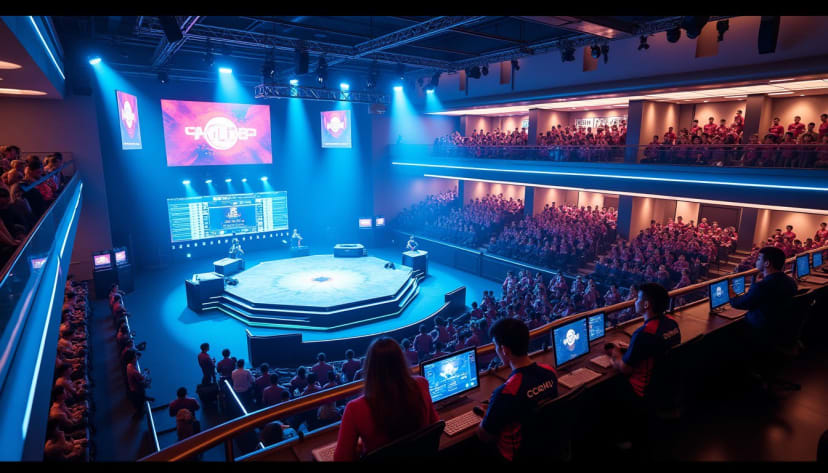Everything to know about: Esports Game Genres
A decade ago, few imagined that esports would rival traditional sports as a spectator phenomenon. Today, games like Counter-Strike: Global Offensive, League of Legends, and Dota 2 draw massive global audiences and generate billions in betting volume. For bettors, understanding the different esports genres provides a key edge. Understanding how these games work, how matches unfold, and where value lies in betting markets enables you to make smarter, more informed wagers. This guide explains the key esports genres and their impact on the betting experience.
Top-Rated eSports Bookmakers
Why It is Important to Understand eSports Genres
Not all esports are created equal — each genre shapes how the game is played, watched, and analyzed. Understanding these differences isn’t just about categorizing titles; it’s about recognizing how game mechanics, match flow, and player decision-making define the competitive experience.
A real-time strategy game like StarCraft 2 rewards macro-level thinking and multitasking, while a shooter such as Counter-Strike 2 emphasizes reflexes and team coordination. MOBAs, meanwhile, introduce long-form strategy and evolving metas. These distinctions influence everything from tournament formats to how players train and perform under pressure.
By understanding genres, fans and analysts can better interpret outcomes, appreciate skill expression, and follow the strategic depth unique to each game type. Recognizing these genre-specific dynamics is what turns casual viewing into informed engagement — and helps audiences understand why every esport demands its own kind of mastery.
First-Person Shooter (FPS) Games
First-person shooters remain one of the most popular and accessible esports genres for online betting. In first-person shooter (FPS) games, players view the action through the eyes of their character, creating an immersive experience. Titles such as Counter-Strike: Global Offensive (CS:GO), Overwatch, Call of Duty: Warzone, Battlefield, and Rainbow Six Siege lead this category.
FPS games attract large audiences and frequent betting activity because they offer clear match formats and fast-paced action. Bettors can wager on match winners, map scores, total rounds, and more. The consistent tournament circuit and high-profile events broadcast globally make FPS games a reliable choice for esports betting markets.
Strategy Games
Strategy games reward critical thinking, long-term planning, and precise execution. Matches often unfold over longer time frames, with players adapting their strategies in real-time. This genre includes titles such as StarCraft II, Warcraft III, Hearthstone, and Age of Empires.
In strategy games, bettors can capitalize on matchups where one player or team demonstrates superior tactical depth or consistency. These games often yield varied outcomes based on player choices, offering opportunities for bettors who closely monitor meta shifts and player performance.
Battle Royale
Battle Royale games deliver fast-paced, survival-based competition where players fight to be the last person or team standing. Titles like PlayerUnknown’s Battlegrounds (PUBG), Fortnite, Apex Legends, and Call of Duty: Warzone dominate this genre.
Battle Royale betting can be volatile due to the genre’s dynamic outcomes; however, skilled bettors focus on placement-based markets or props, such as total kills. Understanding team play styles and individual player performance is crucial for navigating these markets effectively.
Multiplayer Online Battle Arena (MOBA)
MOBA games blend real-time strategy with role-based team dynamics. Teams of five players each control unique characters, or "champions," and battle to destroy the opposing team’s base. Dota 2, League of Legends, and Heroes of the Storm are among the most prominent titles.
MOBA betting markets are diverse, ranging from match winners to specific objectives, such as first blood or tower kills. Bettors who study team compositions, champion picks, and patch impacts gain an advantage. The depth and complexity of MOBA gameplay reward those who stay current on team form, tournament structure, and evolving meta dynamics.
Fighting Games
Fighting games represent one of esports’ oldest and most spectator-friendly genres — matches pit individual players against each other in direct combat, often in best-of-three or best-of-five formats. Popular titles include Street Fighter, Mortal Kombat, Tekken, King of Fighters, and Soul Calibur.
Fighting game betting typically centers on match winners and tournament outcomes. Because matches are fast and skill expression is high, bettors benefit from closely following player form, matchup histories, and tournament seeding.
Racing and Sports Simulators
Racing and sports simulators aim to replicate real-world competitions with high fidelity. In racing games, titles like Gran Turismo, Forza Motorsport, and TrackMania offer structured events with clear outcomes. Sports games such as FIFA, NBA2K, and Madden NFL bring traditional sports into the esports betting space.
Sim racing events often attract both professional drivers and esports veterans, providing bettors with a wealth of data for analysis. Similarly, sports sims feature structured league play, allowing for familiar betting markets such as match winners, point spreads, and totals.
How to Choose the Best Esports Game Genre for Betting
Choosing the right esports genre to focus on is about aligning your knowledge, risk tolerance, and playstyle preferences with how each genre behaves competitively. Some genres offer frequent, fast-paced matches ideal for live bettors, while others reward long-term strategic analysis.
Consider the following when deciding where to specialize:
- 🎯 Familiarity with the Game: Bet on genres you already play or follow — understanding metas and player behavior is a major advantage.
- ⚔️ Match Frequency: FPS and sports titles offer constant action; MOBAs and RTS games have fewer but deeper matches.
- 📊 Data Availability: Strategy-heavy genres (RTS, MOBA) provide richer stats for predictive modeling.
- 💰 Market Variety: Some genres feature more prop bets and live odds than others.
Ultimately, the best esports genre for betting is the one where you understand the gameplay logic as well as the betting logic behind it.
Final Thoughts
Esports betting offers a dynamic and evolving landscape. Understanding the differences between game genres is a crucial first step toward making informed bets. Whether you prefer the tactical depth of a MOBA, the raw intensity of an FPS, or the strategy of a racing simulator, a clear grasp of how these games operate will enhance both your esports betting experience and your results.
By staying informed and approaching each genre with a tailored strategy, you can elevate your esports betting game — and enjoy the thrill of competition across the world’s most exciting titles.
Related News
FAQ
What are the main esports genres for betting?
The most popular esports genres for betting include First-Person Shooters (FPS), Multiplayer Online Battle Arena (MOBA) games, Battle Royale titles, strategy games, fighting games, and racing and sports simulators. Each offers unique match formats and betting opportunities.
Which esports genre is best for beginners to bet on?
First-Person Shooters and MOBA games are ideal for beginners, thanks to their clear structure and frequent tournaments. Games like CS:GO, League of Legends, and Dota 2 provide well-established betting markets and are easier to follow than more niche genres.
Are all esports games suitable for betting?
No. Not every esports game has a competitive scene or structured betting markets. It is important to focus on titles with regulated tournaments and reliable data, such as CS:GO, League of Legends, Dota 2, and Overwatch. These games offer consistent events and enough historical data to inform smart bets.
How do I choose which esports genre to bet on?
Start with games you already understand or enjoy watching. Familiarity with game mechanics, player behavior, and tournament structure gives you an edge. Avoid betting on games you don’t follow regularly, as lack of knowledge increases risk.
Do different esports genres have different betting markets?
Yes. FPS and MOBA games typically offer a wide range of betting markets, including match winners, map outcomes, and in-game objectives. Battle Royale games often focus on placement or kill-based bets, while fighting games and racing simulators offer more straightforward match or time-based wagers.








